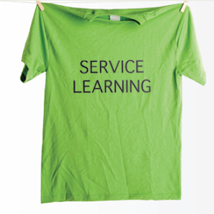The numbers tell some of the story: Lethbridge College Service Learning students provide some  4,300 volunteer hours annually to as many as 60 organizations, many of which ask for one of roughly 100 students involved each semester.
4,300 volunteer hours annually to as many as 60 organizations, many of which ask for one of roughly 100 students involved each semester.
In fact, says Leslie Paradee, service learning co-ordinator, more than 200 community organizations have been helped through service learning since her office opened in 1999. Money provided by the Wild Rose Foundation and the G. L. Talbot Endowment made Lethbridge College one of the first in Canada to adopt the concept into its programs.
“Service learning is a vital part of the college’s philosophy of giving students valuable practical experience and benefiting the community we serve,” says President Tracy Edwards. “We endorse any process that introduces learners to actual roles within society and helps them see the connection and the advantages they can bring to bear from a postsecondary education.”
Service Learning really takes off through the 17 General Studies courses offering it as an option. Courses are open to students from several programs including Nursing, Criminal Justice, and the Nippon Institute of Technology partnership. Participants are required to put in 15 hours serving in a capacity that relates to their course of study. They’ve served at Chinook Regional Hospital, the Lethbridge Soup Kitchen, Lethbridge homeless shelter, YMCA, YWCA, both city seniors organizations, the Boys and Girls Club and various schools.
“The response from those to whom we send students is always positive,” says Paradee. “They’re grateful for the student help, energy and new ideas, and they love having young people around.”
At the start of each semester, Paradee visits those General Studies courses offering service learning and extols the virtues to students. Interestingly, service learning can itself be a 50-hour course, offering students a chance to immerse themselves in one not-for-profit organization as a career exploration.
Students are required to prepare a report on their service learning experiences and are assessed by the organization and Paradee’s office.
“Students are asked to keep reflective journals describing how their experiences relate back to the classroom,” says Paradee. “The journals constitute their mark.”
The main part of the story, of course, is told in the interaction between the students and those they assist. It’s become a symbiotic relationship greater than the sum of its parts. True, learners gain experience and their hosts benefit from the help, but the ties service learning creates between college and community are a huge bonus.
For former students such as Katie Huffman (General Studies 2005), service learning paved a direct route to her future: she chose a placement at Exhibition Park to assist with events.
“During this time, I was presented with challenges that required problem solving and creative thinking,” says Huffman. “I also learned a great deal about Whoop-Up Days and the event-planning industry.” Based on the skills she demonstrated during her service learning, Huffman was offered the summer student position, promoting the farmers’ market and organizing the Whoop-Up Days Parade. She enjoyed the work so much, she returned the following year, scored a full-time position and later became the ex’s trade-show co-ordinator.
Today she’s executive assistant to the president and CEO of the Pacific National Exhibition in Vancouver.
While all service learning takes place close to the campus, Paradee envisions a day when international placements are accommodated in February’s Reading Week.
“Assisting the Third World would be my goal,” she says. ”


